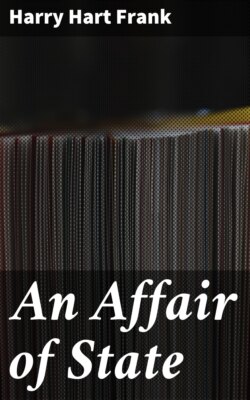Читать книгу An Affair of State - Harry Hart Frank - Страница 6
На сайте Литреса книга снята с продажи.
2
ОглавлениеTable of Contents
There was pitifully little to do about the estate. His father had died while Jeff was in Italy, about the time of the campaign on the Garigliano. (He hardly remembered his mother at all, for she was gone when he was six.) Nicholas Baker left the house in Georgetown, encumbered with a mortgage, and some victory bonds, and two thousand in cash after all debts were paid, and the deed to five building lots in Florida, at a town called Welaka Springs. The building lots had been purchased in 1927, and Jeff surmised, from his father’s correspondence over twelve years, that they would still be under water.
The carefully kept private ledgers made Jeff realize how little he really knew about his father. Nicholas Baker had always seemed a man untouched by personal worries, but always ready to brood about the Manchuria affair, or the Bulgarian cabinet, or the war in Spain, or almost any Central American revolution. Yet in these ledgers he found proof that his father endured many financial indignities. There were Morris Plan loans, and furniture loans, and automobile loans, and the two years to pay for the refrigerator, and the dunning letters from grocers and department stores and the doctors and the Medical Credit Association, and even the undertaker. Sometimes the letters concluded: “If this account is not settled at once it will be brought to the attention of your employers.” Always after that, payment was quick. In 1926 there was a bequest of $2500 from a cousin—that would account for the building lots in Florida. Once there was a notation—“Fifteenth wedding anniversary. Tickets to National Theater $6.60.” It was the only one of its kind.
There were three puzzling loans, each for $500, from Horace Locke. This could only be the Horace Locke who for so many years had been a Chief of Division, and yet it seemed most unlikely that his father would know this Horace Locke well enough to borrow from him. The loans had been made in the years 1931, ’32, and ’33, always in September. What had happened in those years? Weren’t they the lean years of government economy, and the fifteen per cent cut in his father’s salary? Yes, of course they were. He also recalled them as three of the four years he’d gone to Lawrenceville. The notes, like all the notes and bills in the ledgers, were acknowledged, “paid in full.”
The house on Q Street, its bricks crumbling under the porch and its bedroom wallpaper peeling, seemed dreary and aloof as a summer cottage in January. It held him a stranger, and hostile. When Jeff found he could sell it for twice the mortgage, and he might never get such a price again, and that he could move in with Stud Beecham, he sold it. They had grown up together in Georgetown, he and Stud, together fought the tough kids from Foggy Bottom, and double-dated to their first dances. Now Stud was a Field Inspector for Interior. He had a three-room apartment in Riggs Court, off Dupont Circle. It was ample for both of them, so long as they kept each other informed of their plans, and exercised consideration and discretion when returning home after midnight.
